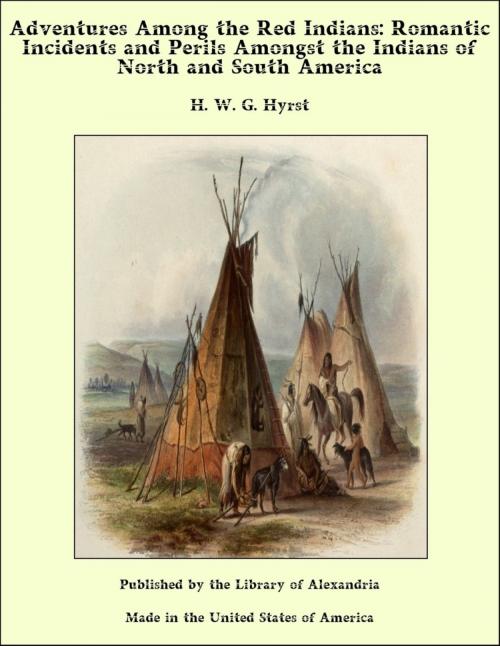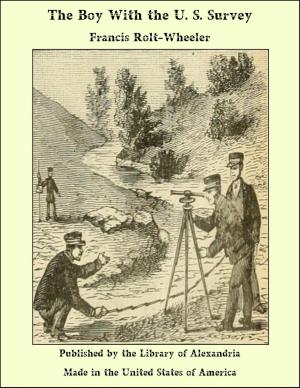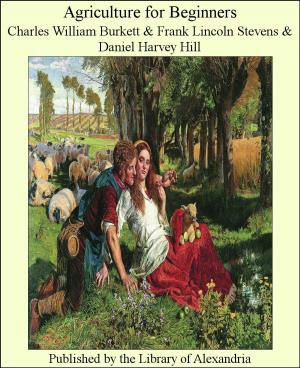Adventures Among the Red Indians: Romantic Incidents and Perils Amongst the Indians of North and South America
Nonfiction, Religion & Spirituality, New Age, History, Fiction & Literature| Author: | H. W. G. Hyrst | ISBN: | 9781465504272 |
| Publisher: | Library of Alexandria | Publication: | March 8, 2015 |
| Imprint: | Language: | English |
| Author: | H. W. G. Hyrst |
| ISBN: | 9781465504272 |
| Publisher: | Library of Alexandria |
| Publication: | March 8, 2015 |
| Imprint: | |
| Language: | English |
In submitting this little book the author does not attempt to edit a history of the rebellion, nor does he assume to be correct in the date of events to a day. He does not hope or expect to make a hero of himself by writing it, for he was far from doing anything heroic, believing, as he does, that most of the heroes of the war were killed. Perhaps the WRITING of this book may stamp him a hero, and for his audacity in so doing some one may kill him. But he intends to clothe his little work in homely, rugged, commonplace language. Not striving to make it a work of literary merit, only a truthful account of an unimportant career and experience in the army. It may, perhaps, be interesting to some of his comrades, who recollect the incidents or recall similar events that happened to themselves, and thereby serve the purpose of introducing one of the youngest soldiers and a comrade of that greatest and most noble of all organizations, the Grand Army of the Republic. The Memorable Bombardment of Fort Sumter. BOMBARDMENT of Fort Sumter. This was the beginning and the first sound of actual war which inspired me, and kindled the fire of patriotism in my youthful breast. The little spark lay smoldering for two long years, ’till at last it burst forth into a full blaze. When Fort Sumter was bombarded, I was a midget of a boy; a barefooted, ragged newsboy in the city of New York. The bombardment was threatened for several weeks before it actually occurred; and many nights I would have been bankrupted, but that everyone was on the “qui vive” for the event, and I got myself into lots of trouble by shouting occasionally, “Fort Sumter Bombarded!” I needed money; it sold my papers, and I forgave myself. When the authentic news did come, I think it stirred up within me as big a piece of fighting desire as it did in larger and older people. I mourned the fact that I was then too small to fight, but lived in hopes that the war would last until I should grow. If I could have gone south, I felt that I could have conquered the rebellious faction alone, so confident was I of my fighting abilities. In the fall of ’61 my dear mOther died, and my father who had a great desire to make possibilities out of improbabilities, and believing a farm the proper place to bring up a family of boys, bought one away in the interior of Maine. The farm was very hilly, covered with huge pines and liberally planted with granite ledges. I used to think God wanted to be generous to this state and gave it so much land it had to be stood up edgeways. Picture to yourself, dear reader, four boys taken from the busy life of a great city, place them in the wilderness of Maine, where they had to make a winrow of the forest to secure a garden spot for the house, pry out the stumps and blast the ledges to sow the seed, then ask yourself what should the harvest be
In submitting this little book the author does not attempt to edit a history of the rebellion, nor does he assume to be correct in the date of events to a day. He does not hope or expect to make a hero of himself by writing it, for he was far from doing anything heroic, believing, as he does, that most of the heroes of the war were killed. Perhaps the WRITING of this book may stamp him a hero, and for his audacity in so doing some one may kill him. But he intends to clothe his little work in homely, rugged, commonplace language. Not striving to make it a work of literary merit, only a truthful account of an unimportant career and experience in the army. It may, perhaps, be interesting to some of his comrades, who recollect the incidents or recall similar events that happened to themselves, and thereby serve the purpose of introducing one of the youngest soldiers and a comrade of that greatest and most noble of all organizations, the Grand Army of the Republic. The Memorable Bombardment of Fort Sumter. BOMBARDMENT of Fort Sumter. This was the beginning and the first sound of actual war which inspired me, and kindled the fire of patriotism in my youthful breast. The little spark lay smoldering for two long years, ’till at last it burst forth into a full blaze. When Fort Sumter was bombarded, I was a midget of a boy; a barefooted, ragged newsboy in the city of New York. The bombardment was threatened for several weeks before it actually occurred; and many nights I would have been bankrupted, but that everyone was on the “qui vive” for the event, and I got myself into lots of trouble by shouting occasionally, “Fort Sumter Bombarded!” I needed money; it sold my papers, and I forgave myself. When the authentic news did come, I think it stirred up within me as big a piece of fighting desire as it did in larger and older people. I mourned the fact that I was then too small to fight, but lived in hopes that the war would last until I should grow. If I could have gone south, I felt that I could have conquered the rebellious faction alone, so confident was I of my fighting abilities. In the fall of ’61 my dear mOther died, and my father who had a great desire to make possibilities out of improbabilities, and believing a farm the proper place to bring up a family of boys, bought one away in the interior of Maine. The farm was very hilly, covered with huge pines and liberally planted with granite ledges. I used to think God wanted to be generous to this state and gave it so much land it had to be stood up edgeways. Picture to yourself, dear reader, four boys taken from the busy life of a great city, place them in the wilderness of Maine, where they had to make a winrow of the forest to secure a garden spot for the house, pry out the stumps and blast the ledges to sow the seed, then ask yourself what should the harvest be















